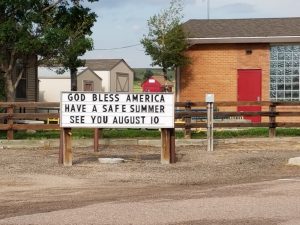“Nonbelief Relief announces timely Much-Needed Grants”
A leading freethought charity is disbursing fresh grants to fight natural and man-made catastrophes currently afflicting our world.
Nonbelief Relief, a charitable organization created by the executive board of the Freedom From Religion Foundation, has announced an additional donation for hurricane-besieged Puerto Rico and new funding to aid the Rohingya refugees in Bangladesh. Nonbelief Relief has also extended a $5,000 stipend to a Bangladeshi atheist who is stranded in Nepal with his wife and child after fleeing for his life from his native country in 2015.
Generous donations from nonreligious Americans to Nonbelief Relief in October have made possible the new $10,000 grant to Americares, earmarked for Puerto Rican relief. Additionally, Nonbelief Relief has redirected $2,500, rejected by Boca Helping Hands to aid its work after Hurricane Irma hit Florida, to Atheists of Puerto Rico, for direct aid to Hurricane Maria victims.
Nonbelief Relief this week also gave $10,000 to Doctors Without Borders, to help its ongoing efforts with the Rohingya refugees, who are suffering on a “scale that we couldn’t imagine,” according to Kate White, the medical emergency manager for Doctors Without Borders in Bangladesh.
“What is happening to the Rohingya is a result of religious persecution,” says Annie Laurie Gaylor, who as FFRF’s co-president acts as administrator of Nonbelief Relief. “There should not be official or de facto national religions. In an ideal world, all governments would be secular, and religion would be an entirely private matter of conscience.”
The grants are in addition to approximately $100,00 in donations given out by Nonbelief Relief earlier this fall to secular charities, many of them providing relief to North American flooding, hurricane or earthquake victims, as well as $10,000 to the nonprofit ConPRmetidos specifically for Puerto Rico.
Nonbelief Relief is aiding a persecuted atheist teacher whose story will appear in the December issue of FFRF’s newspaper, Freethought Today. He was relocated to Nepal by Forum-Asia and has been helped by several groups, including Amnesty International, but those grants have run out. He is not considered a legal immigrant in Nepal and is trying to relocate to another country with the help of some human rights organizations.
Nonbelief Relief Inc. is a humanitarian agency for atheists, agnostics, freethinkers and their supporters to improve this world, our only world. It seeks to remediate conditions of human suffering and injustice on a global scale, whether the result of natural disasters, human actions or adherence to religious dogma. Such relief is not limited to but includes assistance for individuals targeted for nonbelief, secular activism or blasphemy.
Your donation will make a difference by furthering Nonbelief Relief’s work, in the name of atheists, agnostics and other freethinkers. Nonbelief Relief has no overheard costs and all donations go for charitable purposes. Nonbelief Relief is a separate entity from FFRF, but donations can be given via FFRF, making your donation deductible for income-tax purposes.

